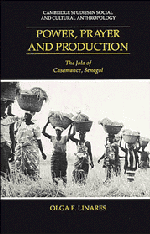Book contents
- Frontmatter
- Contents
- List of illustrations
- List of tables
- Acknowledgements
- Note on orthography
- INTRODUCTION: IDEOLOGY AND AGRARIAN CHANGE
- PART I THE POLITICAL ECONOMY OF SAMBUJAT
- PART II AT THE CROSSROADS: THE KUJAMAAT JOLA OF JIPALOM
- PART III MANDING MODELS AND FATIYA MORES
- Chapter 5 Ideology and legitimation
- Chapter 6 Social relations of production re-structured
- Conclusions to Part III
- EPILOGUE: THE JOLA IN THE PRESENT NATIONAL SCENE
- Notes
- References
- Index
- Cambridge Studies in Social and Cultural Anthropology
Chapter 6 - Social relations of production re-structured
Published online by Cambridge University Press: 04 November 2009
- Frontmatter
- Contents
- List of illustrations
- List of tables
- Acknowledgements
- Note on orthography
- INTRODUCTION: IDEOLOGY AND AGRARIAN CHANGE
- PART I THE POLITICAL ECONOMY OF SAMBUJAT
- PART II AT THE CROSSROADS: THE KUJAMAAT JOLA OF JIPALOM
- PART III MANDING MODELS AND FATIYA MORES
- Chapter 5 Ideology and legitimation
- Chapter 6 Social relations of production re-structured
- Conclusions to Part III
- EPILOGUE: THE JOLA IN THE PRESENT NATIONAL SCENE
- Notes
- References
- Index
- Cambridge Studies in Social and Cultural Anthropology
Summary
Marked distinctions in social status and political power underlie much of Fatiya's public life. The same is true to some extent of more private household and domestic contexts. These also are permeated by subtle power differentials pointing in the direction of increased inequality and social separation between the genders and the generations. There is nothing surprising in this. Public roles are a continuation of private roles, and there is a dialectical interplay between sacred acts and secular routines. In Fatiya, gender relations permeate domestic organization, and this in turn is the result of marriage strategies that facilitate access to the labor power of women. The social organization of production extends beyond the house-hold domain to embrace cooperative forms of work and labor contributions. The present chapter traces these complex relationships. It is an effort to explicate how changing ideologies of power, brought about by exposure to Manding ways, has led to a re-structuring of social relations of production. In the community of Fatiya, and indeed in the whole of the Kalunay, the social separation of cropping systems is the result of a pervasive ideology that makes clearcut distinctions between different categories of people and the roles they play.
Constructing gender relations
Basic processes of social separation lie at the center of gender relations. In Fatiya, institutionalized relations between men and women, and between the elder and younger generations within each gender, are generally modelled after Manding social organization. This is explicitly recognized by the actors themselves. But the knotty question still remains as to what precisely is a Manding model of gender relations, and how one is to grasp its essentially qualitative dimensions.
- Type
- Chapter
- Information
- Power, Prayer and ProductionThe Jola of Casamance, Senegal, pp. 172 - 203Publisher: Cambridge University PressPrint publication year: 1991



